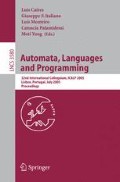Abstract
Let G=(V,E) be a directed graph and let P be a shortest path from s to t in G. In the replacement paths problem we are required to find, for every edge e on P, a shortest path from s to t in G that avoids e. We present the first non-trivial algorithm for computing replacement paths in unweighted directed graphs (and in graphs with small integer weights). Our algorithm is Monte-Carlo and its running time is \({\tilde O}(m\sqrt{n})\). Using the improved algorithm for the replacement paths problem we get an improved algorithm for finding the ksimple shortest paths between two given vertices.
Access this chapter
Tax calculation will be finalised at checkout
Purchases are for personal use only
Preview
Unable to display preview. Download preview PDF.
References
Baswana, S., Hariharan, R., Sen, S.: Improved decremental algorithms for transitive closure and all-pairs shortest paths. In: Proc. of 34th STOC, pp. 117–123 (2002)
Baswana, S., Hariharan, R., Sen, S.: Maintaining all-pairs approximate shortest paths under deletion of edges. In: Proc. of 14th SODA, pp. 394–403 (2003)
Demetrescu, C., Thorup, M.: Oracles for distances avoiding a link-failure. In: Proc. of 13th SODA, pp. 838–843 (2002)
Demetrescu, C., Thorup, M., Alam Chaudhury, R., Ramachandran, V.: Oracles for distances avoiding a link-failure
Eppstein, D.: Finding the k shortest paths. SIAM Journal on Computing 28(2), 652–673 (1998)
Henzinger, M., King, V.: Fully dynamic biconnectivity and transitive closure. In: Proc. of 36th FOCS, pp. 664–672 (1995)
Hershberger, J., Suri, S.: Vickrey prices and shortest paths: what is an edge worth? In: Proc. of 42nd FOCS, pp. 252–259 (2001)
Hershberger, J., Suri, S.: Erratum to “vickrey pricing and shortest paths: What is an edge worth?” In: Proc. of 43rd FOCS, p. 809 (2002)
Hershberger, J., Suri, S., Bhosle, A.: On the difficulty of some shortest path problems. In: Proc. of the 20th STACS, pp. 343–354 (2003)
Karger, D.R., Koller, D., Phillips, S.J.: Finding the hidden path: time bounds for all-pairs shortest paths. SIAM Journal on Computing 22, 1199–1217 (1993)
Katoh, N., Ibaraki, T., Mine, H.: An efficient algorithm for K shortest simple paths. Networks 12(4), 411–427 (1982)
Lawler, E.L.: A procedure for computing the K best solutions to discrete optimization problems and its application to the shortest path problem. Management Science 18, 401–405 (1971-1972)
Malik, K., Mittal, A.K., Gupta, S.K.: The k most vital arcs in the shortest path problem. Operations Research Letters 8(4), 223–227 (1989)
Nardelli, E., Proietti, G., Widmayer, P.: A faster computation of the most vital edge of a shortest path. Information Processing Letters 79(2), 81–85 (2001)
Nisan, N., Ronen, A.: Algorithmic mechanism design. Games and Economic Behavior 35, 166–196 (2001)
Roditty, L., Zwick, U.: Dynamic approximate all-pairs shortest paths in undirected graphs. In: Proc. of 45th FOCS, pp. 499–508 (2004)
Roditty, L., Zwick, U.: On dynamic shortest paths problems. In: Proc. of 12th ESA, pp. 580–591 (2004)
Thorup, M.: Undirected single-source shortest paths with positive integer weights in linear time. Journal of the ACM 46, 362–394 (1999)
Ullman, J.D., Yannakakis, M.: High-probability parallel transitive-closure algorithms. SIAM Journal on Computing 20, 100–125 (1991)
Yen, J.Y.: Finding the K shortest loopless paths in a network. Management Science 17, 712–716 (1970-1971)
Zwick, U.: All-pairs shortest paths using bridging sets and rectangular matrix multiplication. Journal of the ACM 49, 289–317 (2002)
Author information
Authors and Affiliations
Editor information
Editors and Affiliations
Rights and permissions
Copyright information
© 2005 Springer-Verlag Berlin Heidelberg
About this paper
Cite this paper
Roditty, L., Zwick, U. (2005). Replacement Paths and k Simple Shortest Paths in Unweighted Directed Graphs. In: Caires, L., Italiano, G.F., Monteiro, L., Palamidessi, C., Yung, M. (eds) Automata, Languages and Programming. ICALP 2005. Lecture Notes in Computer Science, vol 3580. Springer, Berlin, Heidelberg. https://doi.org/10.1007/11523468_21
Download citation
DOI: https://doi.org/10.1007/11523468_21
Publisher Name: Springer, Berlin, Heidelberg
Print ISBN: 978-3-540-27580-0
Online ISBN: 978-3-540-31691-6
eBook Packages: Computer ScienceComputer Science (R0)

